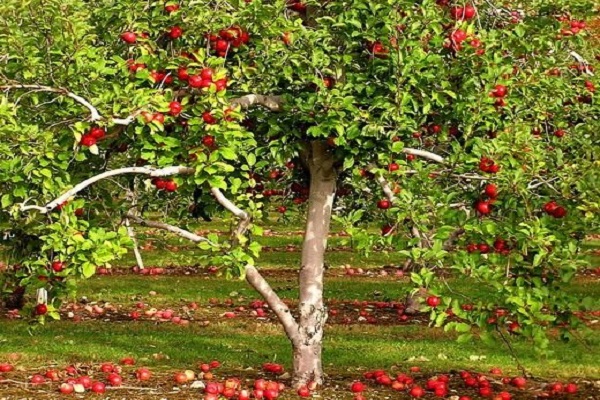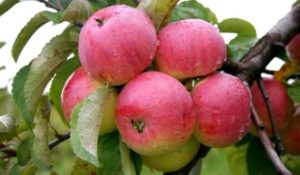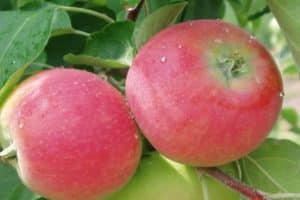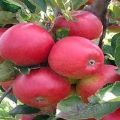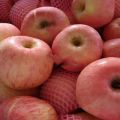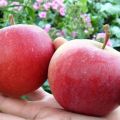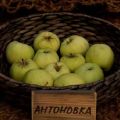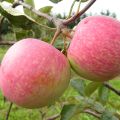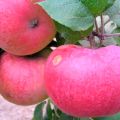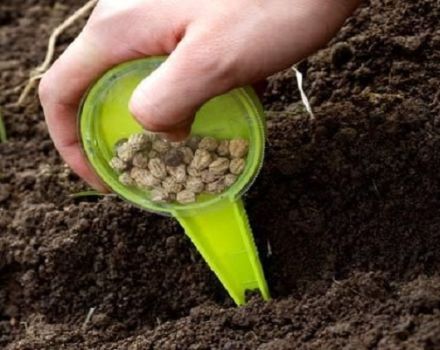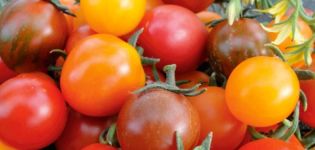Description of the varieties and characteristics of the Pionerka apple variety, the rules for growing in the regions
The variety of varieties of fruit and berry crops makes you think about choosing a suitable option. Apple trees are a common planting in garden plots, one of the popular varieties is Pionerka. The tree performs the function of decorating or zoning the territory as a hedge. The apple tree bears a regular bountiful harvest of tasty fruits. Apples of this variety are a storehouse of useful and nutritious substances.
Description of the Pionerka variety
The apple tree Pionerka is an ornamental fruit tree. Obtained thanks to selective experiments with the Nedzvetskiy variety, which took place on the basis of the Pavlovsk experimental station of VIR. The peculiarities of the plant determine the region of its cultivation, contribute to the implementation of competent planting and further care.
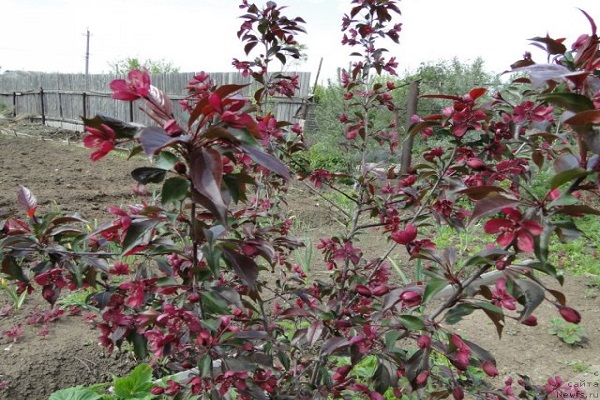
Description of the tree
The apple tree is not tall. Round crown of medium density. The pioneer is appreciated for its decorative appearance. In the warm spring, pink flowers bloom on it, in an original combination with burgundy foliage. The variety is often used in the formation of hedges. A fence made of such a tree becomes the highlight of any garden.
Barrel height
The Pionerka variety is considered medium-sized. The height of its trunk is 3-5 m.
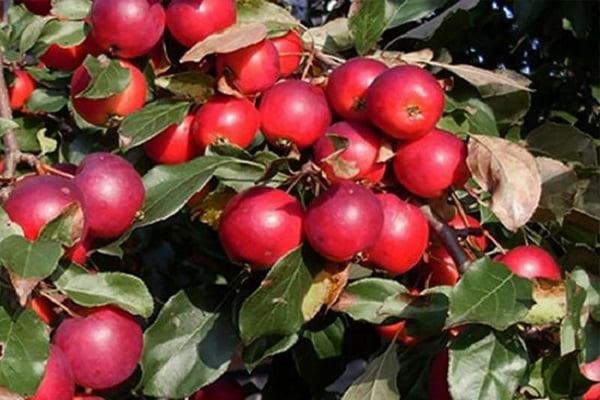
Foliage
A distinctive feature of the apple tree foliage is the ability to radically change color. During flowering and fruiting, narrow leaves of a rich emerald hue. Each of them has red streaks. In autumn, Pionerka is transformed: the crown becomes beetroot.
Apples
Pionerka's harvest consists of red globular small apples. Weight of one - 15-20 g. The pulp inside is juicy, sweet. One fruit contains up to 11% sugar.
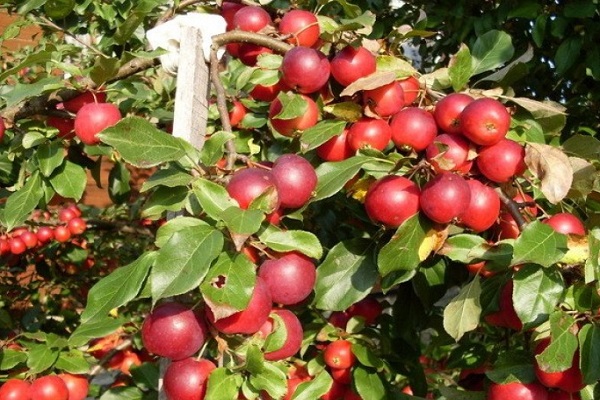
Varieties
In horticulture, the apple tree is represented by two subspecies:
- decorative red-leaved variety;
- Kitayka Red.
The original varieties are most often intended for use in landscape design.
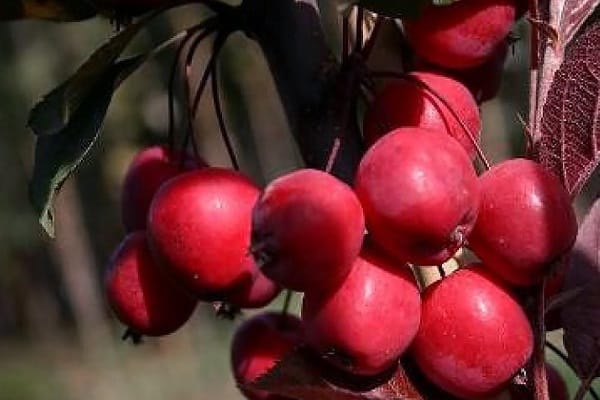
Decorative red-leaved variety
The red-leaved variety is used to decorate hedges.Characteristic features define it as an unpretentious subspecies with high decorative qualities:
- The trees are medium-sized with a trunk height of up to 4 m.
- The crown is rounded, spreading. Reaches several meters in width.
- The foliage changes color from a bright red during flowering to emerald green at the stage of fruit emergence.
- Snow-white flowers bloom on the tree. Then the fruits of a burgundy hue appear.
- The variety is characterized by high resistance to plant diseases.
The decorative red-leaved variety is not picky about environmental conditions. It is successfully cultivated in the regions of the middle zone, in the Urals.
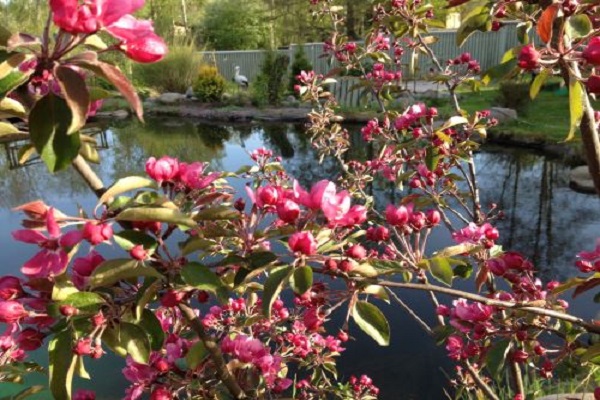
Chinese or Chinese Red
Apple variety Kitayka unpretentious in care. It has a number of undeniable advantages:
- High resistance to frost and drought. Despite the drops in low or high temperatures, the tree retains its decorative qualities.
- During the flowering period, flowers of white, pink or red shades bloom on the crown of Kitayka.
- The harvest is represented by small fruits.
- Before the onset of cold weather, the foliage of the tree changes color to ocher and purple.
Kitayka apples are not stored for long. They are used to make delicious desserts.
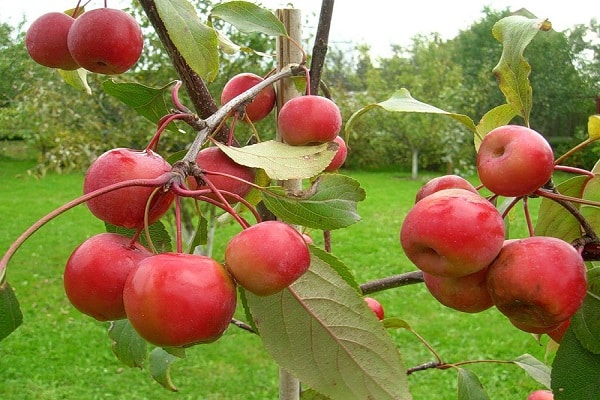
Characteristics of the variety
The characteristic features of the variety should be taken into account for the organization of competent tree care.
Crown formation
The crown of the Pioneer is wide. It is formed thanks to spreading branches and dense foliage. A specific feature is that the leaves on this apple tree last longer than on other trees. Until late autumn, Pionerka retains its rich foliage.
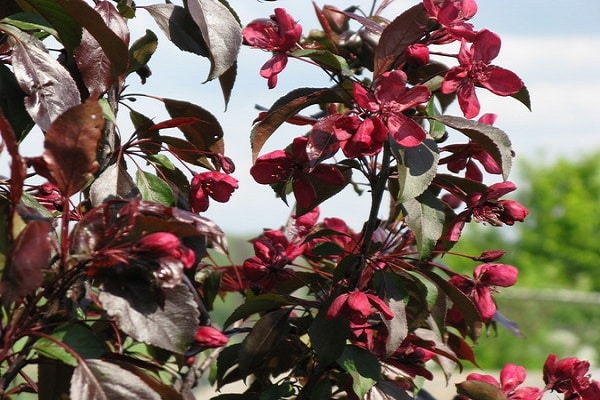
Flowering and pollination process
The variety is considered self-pollinated. It does not need additional pollinators. The apple tree begins to bloom in early May. Pink inflorescences bloom on the branches. Then ovaries are formed on them.
Yield
3-4 years after planting, the first fruiting of the tree begins. The yield increases with age. This can be influenced by proper care. In September, ripe apples are harvested from Pionerki.
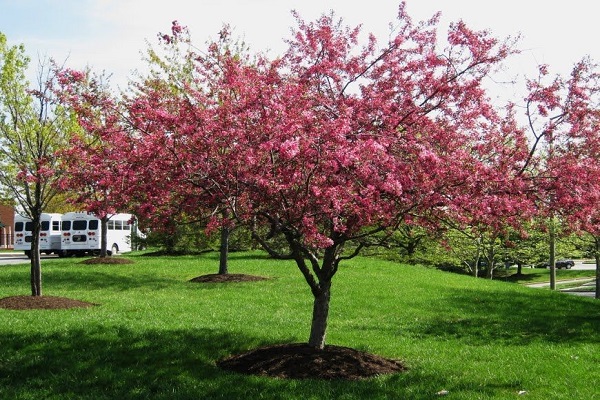
Winter hardiness of decorative Pioneer
The Pionerka apple tree is characterized by high resistance to extreme low temperatures. The tree can withstand up to -25 degrees without damage to the shoots.
Diseases and pests of the tree
The tree is not susceptible to the harmful effects of fungal diseases. It is resistant to scab pathogens - the main variety that affects apple trees.
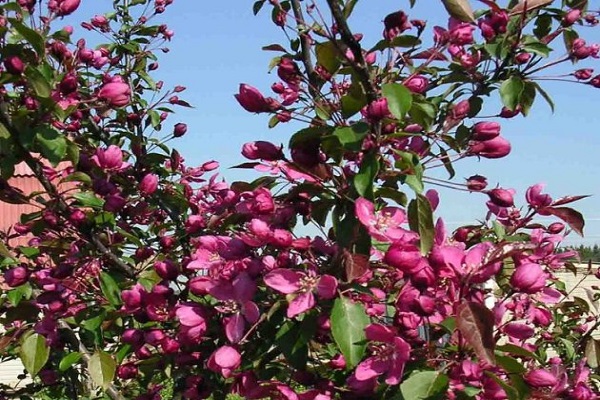
Apple taste
Due to its excellent sweet taste, Pionerka's aromatic apples receive high tasting ratings from gardeners and ordinary summer residents.
Useful and nutrients
Despite their small size, the composition of Pionerka apples is rich in numerous nutrients:
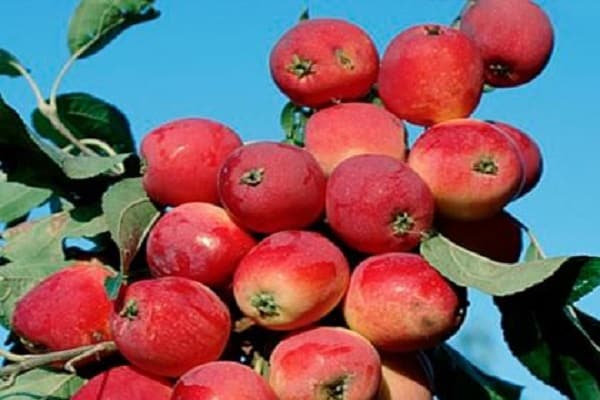
- pectins;
- phytoncides;
- vitamin B, A;
- calcium;
- iron;
- phosphorus.
The antioxidants found in every apple fruit are of great importance. Useful substances inhibit the aging process, prevent the development of gene mutations.
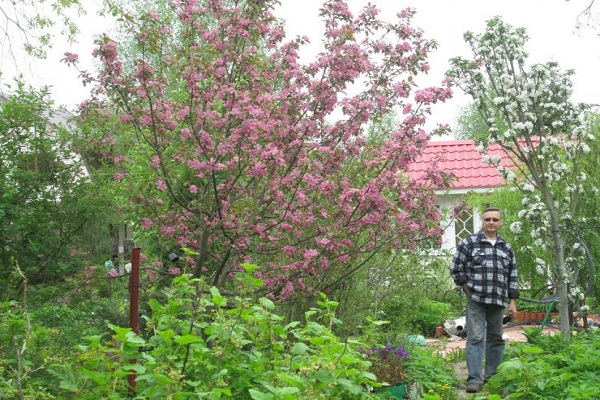
Benefits and contraindications of fruits
Apples of the variety bring significant benefits:
- They have a beneficial effect on intestinal peristalsis.
- Improves the quality of blood vessels.
- Relieve pain during attacks of urolithiasis.
- Saturate the human body with useful substances.
To obtain the most positive effect from apples, it is necessary to observe the measure in their use. An excessive amount of fruit can lead to an exacerbation of peptic ulcer disease.
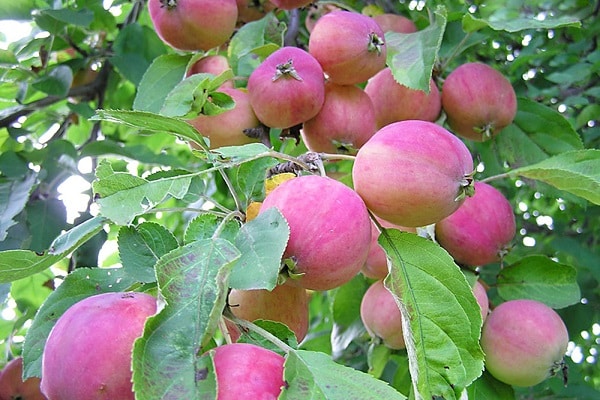
Planting young trees
Proper planting of the apple tree is important for the full development of the tree in the future.
Landing site preparation
The tree prefers fertile soils with good drainage. Stagnant groundwater will adversely affect the health of the young tree. For the apple tree, you need to choose a place protected from drafts and winds.
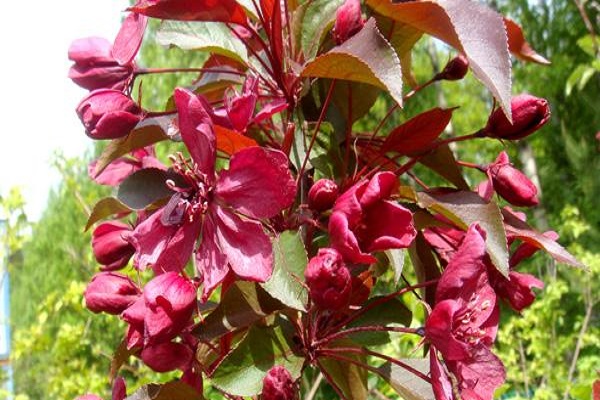
Selection of seedlings
An apple tree seedling for planting must have a healthy and high-quality root system, strong shoots and a trunk.
Distance between seedlings
The distance between seedlings depends on the purpose of planting. If the Pionerka is used as a hedge, then the distance between the seedlings will be up to 5 m. In the case of a single planting, a distance of 10-15 m is allowed.
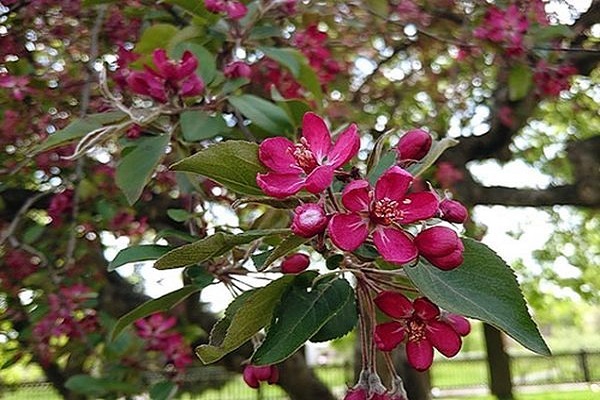
Disembarkation dates
Planting Pionerki is best done in early spring after the first warming. This will allow the seedlings to better adapt to the environment, prepare for the winter cold.
What to do what during the planting process
Planting an apple tree is an easy process. It is enough to follow simple steps:
- Prepare the hole.
- Lay out drainage at the bottom of the pit.
- Lower the seedling down. Spread its roots.
- Sprinkle the plant with a mixture of soil and organic fertilizer, lightly tamp.
- Water the planting with plenty of water.
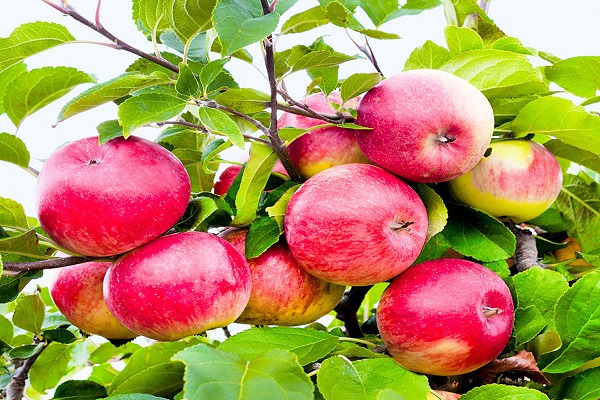
How to grow a healthy tree
Crop care procedures will keep the planting healthy and ensure quality development.
Crown pruning
If the Pionerka apple tree performs decorative functions, then pruning is carried out to form and maintain the given crown shape. Branches are removed from the tree, which violate the composition. Fruit-bearing branches are kept on the plant intended for harvest. Dry, old, diseased branches are removed every autumn. It is recommended to start pruning at the 3-4th year of life.
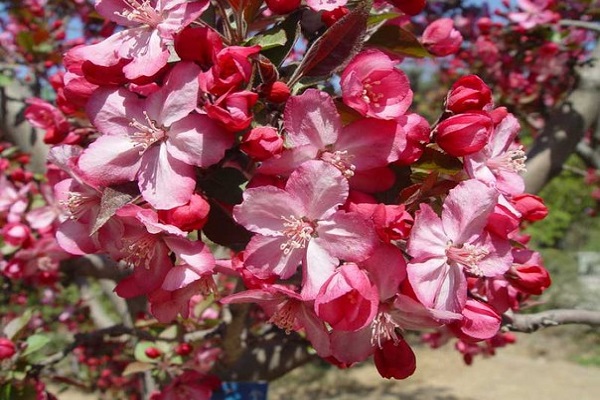
Buds and flowering
3-4 years after planting, Pionerka is capable of fruiting. In early spring, leaves bloom on the tree and buds appear. The apple tree blooms in May. After that, ovaries form on each flower, fruits are formed.
Watering
The Pionerka variety prefers regular moisture. Water the tree once a week. Up to 10 liters of water are consumed per apple tree. The next day, the soil around the trunk is loosened. During dry periods, the amount and frequency of watering is increased.
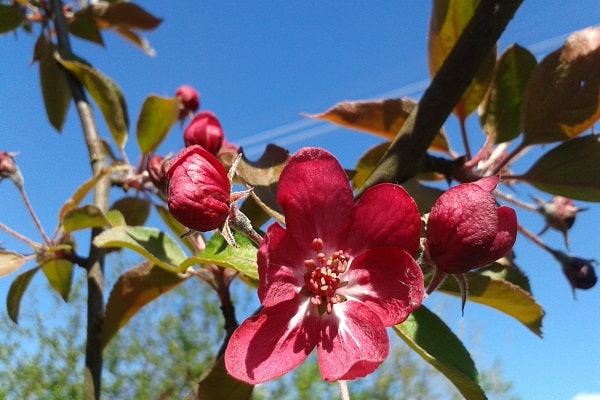
Disease and pest control
The Pionerka apple tree is resistant to fungal diseases and insect pests. Timely preventive measures will reduce the risk of injury to a minimum:
- Before the flowering period, the tree is treated with a solution of potassium permanganate. This will prevent the onset of moniliosis.
- Cleaning the site from fallen leaves and fruits will protect you from scab. Treating with Bordeaux liquid will provide the tree with additional immunity.
Fertilizers
In the spring, Pionerka is fed with nitrogen preparations. Before the onset of cold weather, phosphorus and potash fertilizers are applied.
Pollinators
The Pionerka apple tree does not need additional pollinators. The variety is considered self-pollinated.
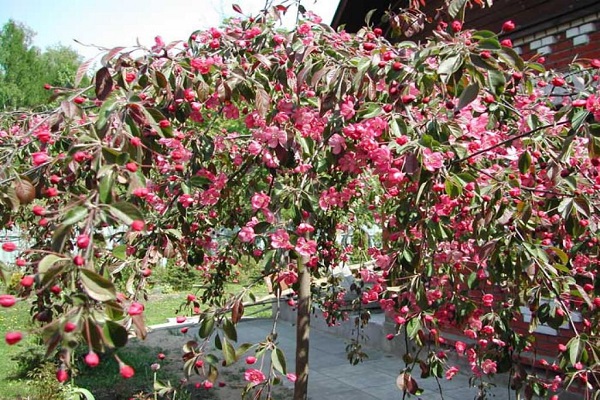
All about the harvest
The harvest of the Pionerka variety is regular. It increases every year after the first fruiting.
Collection
Ripe fruits are harvested in the first half of September. Apples cannot hang on the branches for a long time, so they are cut off immediately after ripening.
Storage
The apples of this variety are not subject to long-term storage. They are consumed after collecting from the tree.
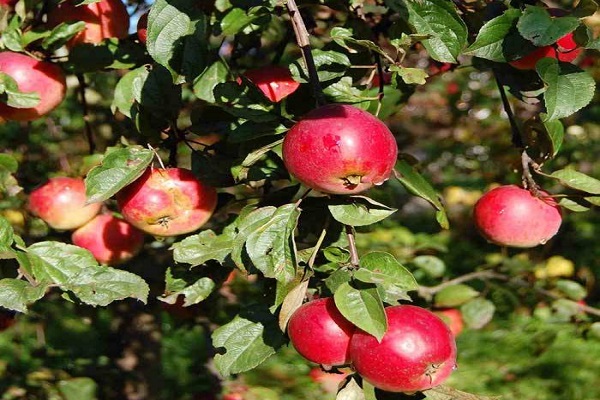
Transportation
Ripe apples should not be transported long distances. They will not withstand long journeys, will lose their presentation, and their taste will deteriorate.
Using
Due to the excellent taste and fragrant aroma, the fruits of the Pionerka variety are perfect for a variety of preservation: preserves, jams, marmalades. Compotes are made from them, juices are made.
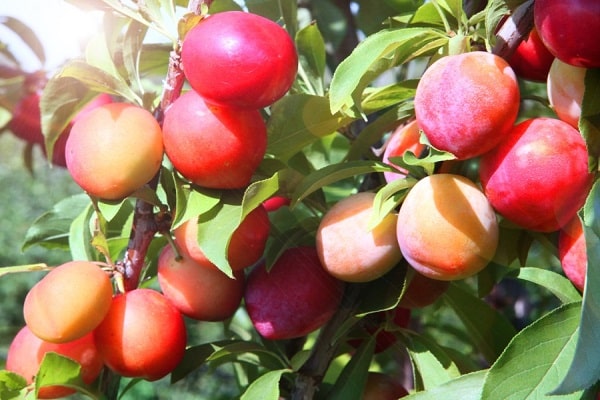
Where is it better to grow red-leaved Pioneer
The Pionerka variety has a high level of winter hardiness and drought resistance. Thanks to such advantages, it is cultivated in many regions of the country:
- Cities of central Russia.
- Suburban areas of the Moscow region.
- Central part.
With proper winter care, the tree can be planted in the northwest areas.
The Pioneer apple tree has many advantages. The tree, unpretentious in care, pleases with abundant harvests of sweet apples.Due to its bright saturated shades of deciduous cover, the variety is often used in landscape design to form original hedges.
